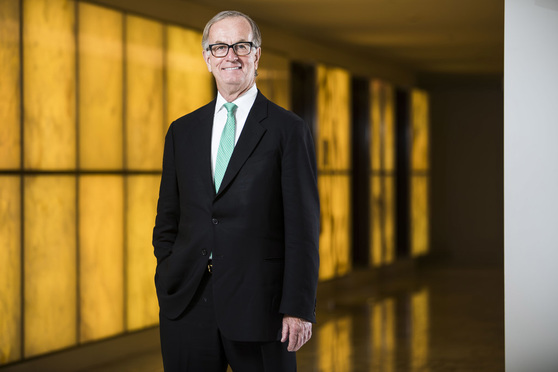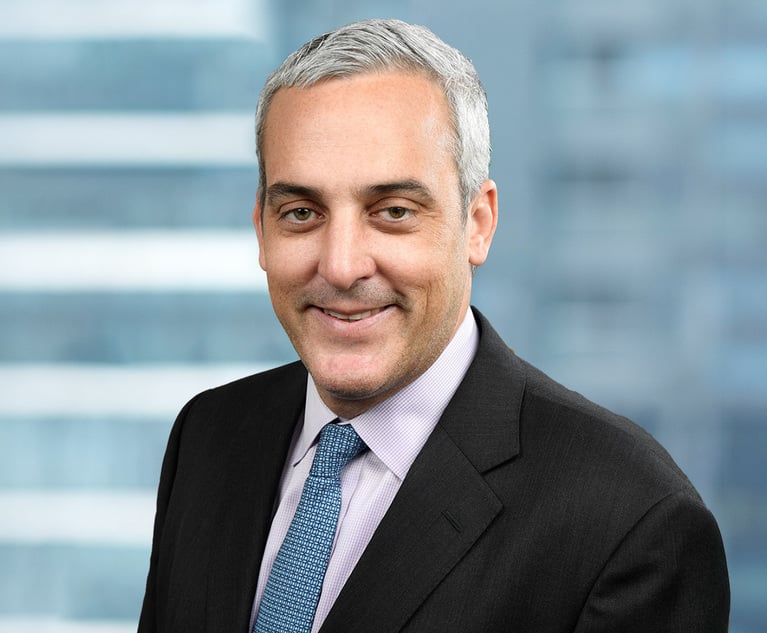Lifetime Achiever: A.B. Culvahouse Jr., O'Melveny & Myers
Throughout his career, A.B. Culvahouse has been the man to turn to for presidents in peril.
August 22, 2018 at 06:00 AM
4 minute read
 A.B. Culvahouse, Jr., chair emeritus and of counsel with O'Melveny & Myers. Photo: Diego M. Radzinschi/ALM.
A.B. Culvahouse, Jr., chair emeritus and of counsel with O'Melveny & Myers. Photo: Diego M. Radzinschi/ALM.
In response to the calls of his country and his clients, A.B. Culvahouse often appears in the wrong place at exactly the right time.
Culvahouse, 70, crafted a career spanning more than 40 years in Washington, D.C., as an East Tennessee emigrant dedicated to public service who rose to lead one of thecountry's top law firms. His work has revolved around presidents in peril, from Watergate to Iran-Contra, and his business card is within reach whenever Republicans need to vet candidates for the nation's highest offices.
“I got the bug early on,” Culvahouse says. “I came to Washington fully expecting to stay 18 months, and I've been here since '73.”
“If you're in trouble with the government, then A.B. Culvahouse is your best lawyer available,” says Sen. Lamar Alexander, R-Tennessee, reiterating advice he has proffered for many years. The pair first met when Culvahouse was an undergraduate at the University of Tennessee in the late 1960s. Alexander connected him with then-Sen. Howard Baker, R-Tennessee, helping Culvahouse land a job after graduating New York University School of Law.
The timing couldn't have been better. Two weeks after starting to work with Baker, he says, “I was sitting behind him at the Watergate hearings when he asked John Dean the famous question, 'What did the president know, and when did he know it?'”
As the senator's chief legislative assistant and counsel, Culvahouse also worked with Baker on an investigation of the U.S. intelligence services. He says Warren Christopher, the late secretary of State and O'Melveny partner, recruited him to the Los Angeles-founded firm just as it was opening its Washington office.
When Baker served as White House chief of staff during the final years of President Ronald Reagan's administration, Culvahouse joined as White House counsel for two years.
Culvahouse's proudest contribution in that time was defending President Reagan during the Iran-Contra investigation. His “great regret” was failing to confirm Judge Robert Bork to the U.S. Supreme Court—though he adds the nation was “lucky” to wind up with Justice Anthony Kennedy.
Sidley Austin partner Peter Keisler, who worked under Culvahouse in the Reagan White House, says Culvahouse is a selfless leader and skillful lawyer.
“A.B. was kind of the classic lawyer who is really thinking very single-mindedly about his clients, and his client wasn't just Ronald Reagan, but the office of the presidency,” Keisler says.
Back in private practice, Culvahouse rose to become chairman of O'Melveny from 2000 to 2012. He guided the firm through the great recession and worked easily alongside partners with opposing political pedigrees. During his 12 years at the helm, O'Melveny added five new offices and grew revenue per lawyer by 80 percent.
O'Melveny's Tom Donilon, who was Culvahouse's adversary in the Bork confirmation fight before they became colleagues, says Culvahouse's warm personality and formal demeanor built confidence in clients and colleagues.
“He has a way of coming in and really filling up a room,” Donilon says, noting his deep voice and Southern accent. “But the main thing that he brings is judgment and attention to detail—and they don't always go together.”
During the 2016 election, Culvahouse helped vet vice presidential candidates for Donald Trump, as he previously did for John McCain. More recently, Culvahouse reportedly declined an overture to help Trump fend off special counsel Robert Mueller. He declined to comment on the accuracy of such reports and matters involving the special counsel.
Advice to young lawyers: “Sometimes [government work] makes for long days, long weekends and interrupted careers, but you become a better lawyer.”
Email: [email protected]
This content has been archived. It is available through our partners, LexisNexis® and Bloomberg Law.
To view this content, please continue to their sites.
Not a Lexis Subscriber?
Subscribe Now
Not a Bloomberg Law Subscriber?
Subscribe Now
NOT FOR REPRINT
© 2025 ALM Global, LLC, All Rights Reserved. Request academic re-use from www.copyright.com. All other uses, submit a request to [email protected]. For more information visit Asset & Logo Licensing.
You Might Like
View All
Latham Adds Former Treasury Department Lawyer for Cross-Border Deal Guidance
2 minute read

Sidley Adds Ex-DOJ Criminal Division Deputy Leader, Paul Hastings Adds REIT Partner, in Latest DC Hiring
3 minute read
‘High Demand’: Former Trump Admin Lawyers Leverage Connections for Big Law Work, Jobs
4 minute readTrending Stories
- 1Big Law Firms Sheppard Mullin, Morgan Lewis and Baker Botts Add Partners in Houston
- 2Lack of Jurisdiction Dooms Child Sex Abuse Claim Against Archdiocese of Philadelphia, says NJ Supreme Court
- 3DC Lawsuits Seek to Prevent Mass Firings and Public Naming of FBI Agents
- 4Growth of California Firms Exceeded Expectations, Survey of Managing Partners Says
- 5Blank Rome Adds Life Sciences Trio From Reed Smith
Who Got The Work
J. Brugh Lower of Gibbons has entered an appearance for industrial equipment supplier Devco Corporation in a pending trademark infringement lawsuit. The suit, accusing the defendant of selling knock-off Graco products, was filed Dec. 18 in New Jersey District Court by Rivkin Radler on behalf of Graco Inc. and Graco Minnesota. The case, assigned to U.S. District Judge Zahid N. Quraishi, is 3:24-cv-11294, Graco Inc. et al v. Devco Corporation.
Who Got The Work
Rebecca Maller-Stein and Kent A. Yalowitz of Arnold & Porter Kaye Scholer have entered their appearances for Hanaco Venture Capital and its executives, Lior Prosor and David Frankel, in a pending securities lawsuit. The action, filed on Dec. 24 in New York Southern District Court by Zell, Aron & Co. on behalf of Goldeneye Advisors, accuses the defendants of negligently and fraudulently managing the plaintiff's $1 million investment. The case, assigned to U.S. District Judge Vernon S. Broderick, is 1:24-cv-09918, Goldeneye Advisors, LLC v. Hanaco Venture Capital, Ltd. et al.
Who Got The Work
Attorneys from A&O Shearman has stepped in as defense counsel for Toronto-Dominion Bank and other defendants in a pending securities class action. The suit, filed Dec. 11 in New York Southern District Court by Bleichmar Fonti & Auld, accuses the defendants of concealing the bank's 'pervasive' deficiencies in regards to its compliance with the Bank Secrecy Act and the quality of its anti-money laundering controls. The case, assigned to U.S. District Judge Arun Subramanian, is 1:24-cv-09445, Gonzalez v. The Toronto-Dominion Bank et al.
Who Got The Work
Crown Castle International, a Pennsylvania company providing shared communications infrastructure, has turned to Luke D. Wolf of Gordon Rees Scully Mansukhani to fend off a pending breach-of-contract lawsuit. The court action, filed Nov. 25 in Michigan Eastern District Court by Hooper Hathaway PC on behalf of The Town Residences LLC, accuses Crown Castle of failing to transfer approximately $30,000 in utility payments from T-Mobile in breach of a roof-top lease and assignment agreement. The case, assigned to U.S. District Judge Susan K. Declercq, is 2:24-cv-13131, The Town Residences LLC v. T-Mobile US, Inc. et al.
Who Got The Work
Wilfred P. Coronato and Daniel M. Schwartz of McCarter & English have stepped in as defense counsel to Electrolux Home Products Inc. in a pending product liability lawsuit. The court action, filed Nov. 26 in New York Eastern District Court by Poulos Lopiccolo PC and Nagel Rice LLP on behalf of David Stern, alleges that the defendant's refrigerators’ drawers and shelving repeatedly break and fall apart within months after purchase. The case, assigned to U.S. District Judge Joan M. Azrack, is 2:24-cv-08204, Stern v. Electrolux Home Products, Inc.
Featured Firms
Law Offices of Gary Martin Hays & Associates, P.C.
(470) 294-1674
Law Offices of Mark E. Salomone
(857) 444-6468
Smith & Hassler
(713) 739-1250










